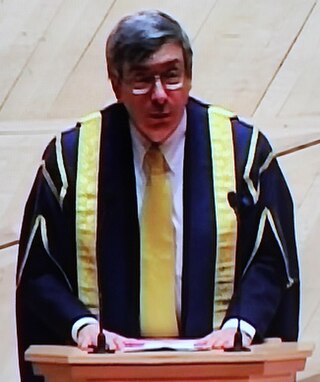
Nuffield College is one of the constituent colleges of the University of Oxford in England. It is a graduate college and specialises in the social sciences, particularly economics, politics and sociology. Nuffield is one of Oxford's newer colleges, having been founded in 1937, as well as one of the smallest, with around 90 postgraduate students and 60 academic fellows. It was also the first Oxford college to accept both men and women, having been coeducational since its foundation.

The Institute for Fiscal Studies (IFS) is an economic research institute based in London, United Kingdom, which specialises in UK taxation and public policy. It produces both academic and policy-related findings.
The Higher Education Funding Council for England (HEFCE) was a non-departmental public body in the United Kingdom, which was responsible for the distribution of funding for higher education to universities and further education colleges in England since 1992. It ceased to exist as of 1 April 2018, when its duties were divided between the newly created Office for Students and Research England.

The Wellcome Trust is a charitable foundation focused on health research based in London, in the United Kingdom. It was established in 1936 with legacies from the pharmaceutical magnate Henry Wellcome to fund research to improve human and animal health. The aim of the Trust is to "support science to solve the urgent health challenges facing everyone." It had a financial endowment of £29.1 billion in 2020, making it the fourth wealthiest charitable foundation in the world. In 2012, the Wellcome Trust was described by the Financial Times as the United Kingdom's largest provider of non-governmental funding for scientific research, and one of the largest providers in the world. According to their annual report, the Wellcome Trust spent GBP £1.1Bn on charitable activities across their 2019/2020 financial year. According to the OECD, the Wellcome Trust's financing for 2019 development increased by 22% to US$327 million.

Science Foundation Ireland is the statutory body in Ireland with responsibility for funding oriented basic and applied research in the areas of science, technology, engineering and mathematics (STEM) with a strategic focus. The agency was established in 2003 under the Industrial Development Act 2003 and is run by a board appointed by the Minister for Further and Higher Education, Research, Innovation and Science. SFI is an agency of the Department of Further and Higher Education, Research, Innovation and Science.

Sir Richard Hughes Trainor,, is an academic administrator and historian who served as the Principal of King's College London from 2004 to 2014. He was previously the Vice-Chancellor of the University of Greenwich from 2000 to 2004. He is currently Rector (head) of Exeter College, Oxford.

The Cambridge Biomedical Campus is the largest centre of medical research and health science in Europe. The site is located at the southern end of Hills Road in Cambridge, England.

University Alliance (UA) is an association of British universities which was formed in 2006 as the Alliance of Non-Aligned Universities, adopting its current name in 2007.
The Science and Technology Facilities Council (STFC) is a United Kingdom government agency that carries out research in science and engineering, and funds UK research in areas including particle physics, nuclear physics, space science and astronomy.
The Nuffield Trust, formerly the Nuffield Provincial Hospitals Trust, is a charitable trust with the mission of improving health care in the UK through evidence and analysis.
Alastair Buchan is a British neurologist and researcher in stroke medicine. His main research interest is how to make neuroprotection a reality in the clinic. From October 2008 until January 2017, he served as the Dean of Medicine and the Head of the Medical Sciences Division, University of Oxford. He currently holds the Chair of Stroke Research and is the Pro-Vice-Chancellor and Head of Brexit Strategy at the University of Oxford.
The Nuffield Council on Bioethics is a UK-based independent charitable body, which examines and reports on bioethical issues raised by new advances in biological and medical research. Established in 1991, the Council is funded by the Nuffield Foundation, the Medical Research Council and the Wellcome Trust. The Council has been described by the media as a 'leading ethics watchdog', which 'never shrinks from the unthinkable'.
Y Touring Theatre Company was a national touring theatre company which produced original plays and debates exploring contemporary issues. It was founded in 1989 by Nigel Townsend. The company was based in Kings Cross, London, England and was a former operation of Central YMCA.

The Wellcome Centre for Human Genetics is a human genetics research centre of the Nuffield Department of Medicine in the Medical Sciences Division, University of Oxford, funded by the Wellcome Trust among others.
The various academic faculties, departments, and institutes of the University of Oxford are organised into four divisions, each with its own Head and elected board. They are the Humanities Division; the Social Sciences Division; the Mathematical, Physical and Life Sciences Division; and the Medical Sciences Division.
The Independent Research Fund Denmark, until 2017 known as Danish Council for Independent Research of Denmark funds basic research and gives advice to government and parliament. The Danish Agency for Science, Technology and Innovation (DASTI) oversees its activity. As of 2012 the council has five sub-councils: Humanities, Medical Sciences, Natural Sciences, Social Sciences, and Technology and Production Sciences.
Sarah Elizabeth Lamb is the Pro-Vice-Chancellor and Executive Dean of the Faculty of Health and Life Sciences at the University of Exeter, and the Mireille Gillings Professor for Health Innovation. She is also an Honorary Departmental Professor at the Nuffield Department of Medicine, University of Oxford and the Director of the Oxford Clinical Trials Research Unit.

The Urology Foundation (TUF) is a charity that works across the UK and Ireland with the aim of improving the knowledge and skills of surgeons who operate on diseases of the male and female urinary-tract system and the male reproductive organs and funds research to improve outcomes of all urological conditions and urological cancers.
Russell Mardon Viner, FMedSci is an Australian-British paediatrician, data scientist, policy researcher and Professor of Adolescent Health at the UCL Great Ormond Street Institute of Child Health. He is an expert on child and adolescent health in the UK and internationally. He was a member of the UK Government's Scientific Advisory Group for Emergencies (SAGE) during the COVID-19 pandemic and was President of the Royal College of Paediatrics and Child Health from 2018 to 2021. He remains clinically active, seeing young people with diabetes each week at UCL Hospitals. His research focuses on the health of children and young people, from global analyses of social determinants of health and global burden of disease (GBD), through use of ‘big’ routine data in children and young people’s healthcare, to conducting intervention studies both at the school level and clinical interventions in obesity and diabetes.
Sir Martin Jonathan Landray is a British physician, epidemiologist and data scientist who serves as a Professor of Medicine & Epidemiology at the University of Oxford. Landray designs, conducts and analyses large-scale randomised control trials; including practice-changing international trials that have recruited over 100,000 individuals. Landray previously led the health informatics team that enabled the collection and management of data for the UK Biobank on over half a million people.








